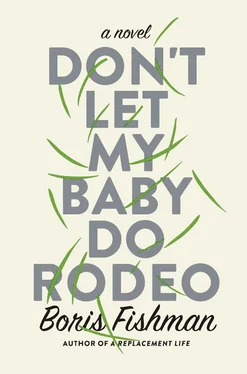She cursed herself. The drink that she had intended to weaken Mishkin had instead weakened her. This was not the way to bring it up! She had worked out the plan in the car with Alex: charming stories about the boy to arouse Mishkin’s sympathy; a reassertion of what a blessing Mishkin had helped bring into their lives; a laugh about that crazy visit by the birth parents. But that was it, you see, Maya would say casually, the parents had known something, the mother had made that odd comment before leaving. .
It was too late now. Mishkin’s wooded face, which had relaxed since their greeting, became dark with anticipation. Maya wanted to take some kind of gardening shear to it, to set free the man underneath.
“The boy is wild,” Maya said, giving up.
“The boy is savage,” Alex added.
“Excuse me?” Mishkin said.
“He runs away—”
“All the time,” Alex said, animated.
“They find him—”
“Sitting in a river,” Alex finished.
“He eats grass,” Maya declared; if such a detail was not going to get Mishkin’s attention, she didn’t know what would.
“Are you joking?” Mishkin said.
“We need to find the parents,” Alex said, taking over. “They know something. The young man, Tim, he was limping — you remember. And the strange thing the mother said before leaving. About rodeo. I’m not sure that was the truth. We just want the truth, so we can help our boy. We don’t want from them anything else. Or the agency — if something was missed, something was missed, let us find out about it now.” Maya was aware that Alex had tried to speak carefully, cautiously — he was trying to use her language because he was aware that his was antagonistic. “We’re not going to sue,” Alex attempted to be reassuring, but the very invocation of legal matters had the opposite effect.
“Mr. Rubin,” Mishkin said as he tried to sit up in his rocking chair. “How long ago did this—” He stopped himself. “I don’t know where to begin.” He fell back into his chair and rocked silently. “I don’t see what it has to do with the birth parents.”
“We want to have one conversation,” Alex said. “Is that so much to ask?”
“You want to converse with the parents?” Mishkin said. “If I remember correctly, Mr. Rubin, you were pretty firm about a closed adoption.”
Maya held out her glass toward Mishkin. If he had another as well, perhaps it would make him more charitable. But when he returned a moment later, he held only her glass, refilled.
“Mr. Rubin, you know you can have the agency send them a letter,” he said.
“No!” Alex said. “No more agency.”
“The agency called the number they have,” Maya lied, glancing at Alex. “Someone else answered. They don’t live there anymore.”
“So what can I do?” Mishkin said, defending his chest with his hands.
“You can tell us the town,” Maya said.
“Mrs. Rubin, those kids can be in Shanghai by now.”
“If so,” Alex said, “someone in town would know.”
“Mr. Rubin, this isn’t the Soviet Union. People are free to move about with no warning to anyone. Those kids could have spent a year in Montana on the way from California to God knows where.”
“She said ‘rodeo,’” Maya said. “There’s no rodeo in Shanghai. There is rodeo in Montana. I looked it up. It’s only the town, Mr. Mishkin!”
Mishkin looked over at Alex in a plea for help. Emotion was keeping Alex’s wife from seeing the full network of dead ends: Yes, those were the places for rodeo, but the young man might no longer be in rodeo. .
“Mrs. Rubin, when you leave the adoption agency, they take away your clearance, so to speak,” Mishkin said. “But they keep the gag order. I don’t have any of the files. I signed an agreement.”
“Oh, yes?” Maya said. “Are you writing your memoirs from memory?”
Mishkin tsked unhappily.
“You brought together one hundred fifty families,” Maya said. “You remember that we didn’t get Max from the hospital. But you don’t remember the town they’re from.”
“I don’t,” Mishkin said unpersuasively.
“So it was all right for them to come into our house, but we can’t return the favor,” Alex said.
“I understand that was a departure from”—Mishkin searched for the words—“the norm. But things like that happen at the eleventh hour. In retrospect, there may have been a better way to do things, sure. But you have to make the call in the moment. You want to say I made a mistake, go ahead.”
“Make another one,” Alex said.
“Mr. Rubin, two wrongs don’t make a right.”
“Yes, Mr. Mishkin,” Maya said. “Please explain to us how things are done in America.”
A resentful silence settled on the room. Maya clutched her temples, which pounded with the animus of the whiskey. She swung her legs into the small space between her and her husband. Mishkin’s eyes grew wide; now, Maya Rubin was prostrate on his sectional.
He cleared his throat. “Are you all right, Mrs. Rubin?”
“We will leave,” she said hoarsely from the couch. “I just need fifteen minutes without noise until this migraine goes away. I am a terrible sufferer of migraines.”
“Mrs. Rubin!” Mishkin exclaimed. “Making you feel this way is the last thing in the world. .” He trailed away. They sat silently for a minute, until Mishkin was no longer able to bear the tableau of agonized wife and stone-faced husband.
“How about going upstairs, Mrs. Rubin?” he said. “There’s a guest room there.”
Maya moaned in distress, her palm on her forehead. Mishkin consulted Alex again, but Alex was looking past all of them, out at the woods.
Mishkin rose. “I’m going to give you some time,” he said. “I have to chop some wood for the sauna.”
Maya turned to face Mishkin. “Please don’t,” she said. “The chopping will make it worse.”
“Of course,” Mishkin said. “That was foolish of me. Sorry.”
“No, it was kind of you,” Maya said. “If I can be alone without noise, it should go away quickly. Will you take a walk with my husband?” She looked fleetingly at Alex, and, catching his eyes, wished to believe that he understood her intentions — or simply that she had some, and needed his help. They had had many moments of misunderstanding, of dissent — weren’t they due for one of silent concert? “Show Alex the homes here,” she went on. “We’ve been talking about a country place to please Max. If he wants to eat grass, let him at least eat grass where the air is clear. Come back in a half hour, and I will be back to normal.”
“Mrs. Rubin,” Mishkin said. “Please don’t take this the wrong way. But all the paperwork related to my time at the agency is under lock and key.”
She turned to face him again, wincing from the effort. “Mr. Mishkin, my son seems to have been birthed by a wolf. I came to you to plead for a clue, and you said no. Don’t add insult to what I am feeling. I need a half hour without noise. Every minute that we talk extends the recovery time.” She searched out his eyes. “And now forgive me for being rude, Mr. Mishkin, but I am a Jewish mother. When was the last time you went outside?”
Maya looked up at her husband. Alex rose, hoping that would stir Mishkin. “Go, please,” she said, in a voice choked by imminent tears. That did it. Confronted by the possibility of imminent tears, the men hustled into the hallway. Then the door shut behind them. Maya counted out a minute and swung her feet to the floor.
No, she was not going to look for agency paperwork. And she didn’t have time to clean as she would have liked. As she passed the crowded dining room table on her way to the kitchen, she saw the cover page of Mishkin’s opus: Memoirs: An Attempt at Living .
Читать дальше












